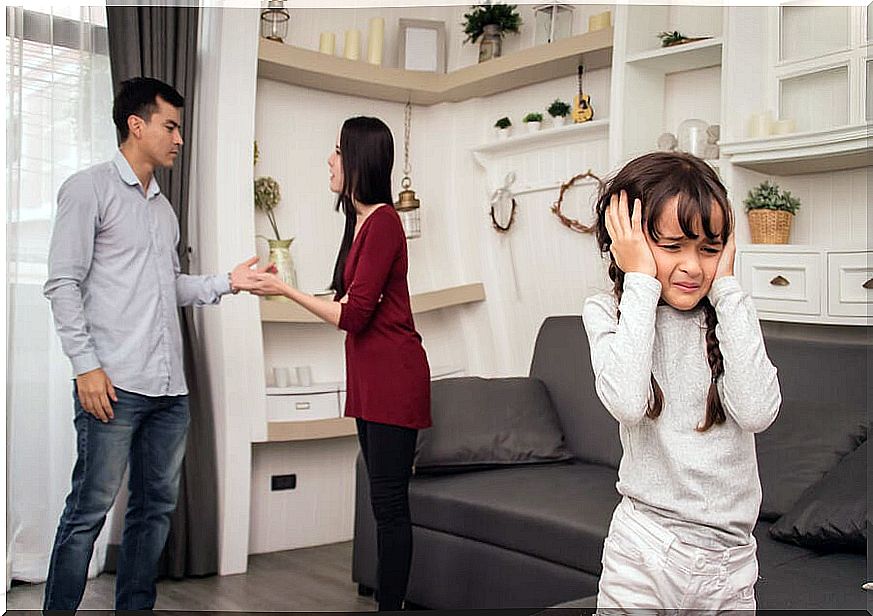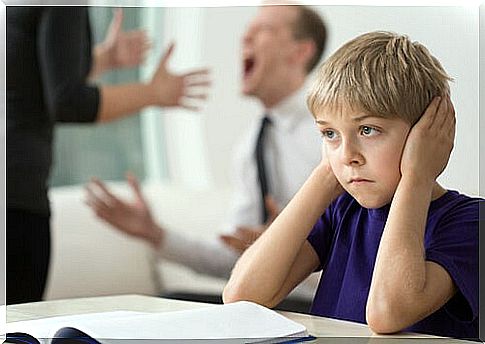Discussions Of Parents Better Away From Children

It is normal for parents to disagree and argue from time to time. Sometimes couples may not share the same opinion and can still talk about it in a calm way. In case this is not the case, remember: the arguments of the parents better away from the children.
Ideally, have a talk in which both people have the opportunity to speak and listen to different points of view. However, there are many cases in which parents do not agree and it all ends in an argument.
Certainly most children worry when their parents argue, causing them to feel scared, sad, or upset. Even when they turn to silence around arguments, they can also hide a feeling of guilt.
In addition, conflicts between parents can affect a child’s mental health and the development of social and emotional skills, as well as influence academic achievement and affect their ability to form future relationships.
In fact, one study has found that unresolved conflict between parents has a powerful influence on children’s early development, mental health, and future life prospects.
Why shouldn’t you argue in front of the children?
Mainly, it is not good for you to argue with your partner in front of your children for the following reasons:
1. Children are emotionally insecure
Arguments provoke a feeling of insecurity in the children about the stability of the family. Children who are exposed to a lot of fights may worry about divorce.
Also, it can make it difficult for them to have a sense of normalcy regarding family; It is because the reasons for fights can be unpredictable and occur at any time.

2. The parent-child relationship can be affected
Conflict is stressful for children and, without a doubt, for parents as well. A stressed parent cannot spend quality time with their children. Meanwhile, it can also be difficult for them to show warmth and affection when they are angry and upset with the attitude of the elderly.
3. Fighting creates a stressful environment
Listening to frequent or intense arguments is not pleasant for children and can lead to stress. These situations can affect their physical and psychological well-being, as well as interfere with the normal and healthy development of the child.
Also, research found that the stress associated with living in a high-conflict home can affect a child’s cognitive performance.
The researchers revealed that when parents fight frequently, children have a harder time regulating their attention and emotions. Furthermore, your ability to solve problems effectively is also compromised.
The arguments of the parents better away from the children
Often children care about the meaning discussions with parents and the consequences that may entail. This causes them to jump to conclusions and think that fights mean that their parents no longer love each other.
However, parents’ arguments do not mean that they do not love each other or that they want a separation. Fortunately, most of the time, conflicts are just a way to vent when they have a bad day or don’t share an opinion.
In fact, children of all ages can be affected by a conflict between parents. Consequences generally appear through high levels of aggression, hostility, and violence. Internally, they may show low levels of self-esteem, as well as episodes of anxiety and depression.

How do children feel about parenting arguments?
Children are generally upset when they see or hear parents arguing. It is difficult for them to hear the yelling and unpleasant words. Similarly, seeing parents bewildered and out of control can leave infants feeling unprotected and scared.
Youngsters may worry about a parent during the discussion. Your concern is often that you feel especially sad or hurt for the other party.
Sometimes parents’ arguments make children cry or cause any kind of physical discomfort. For example, a stomach ache caused by nerves may appear or they may even have difficulty sleeping or concentrating at school.
Finally, remember that parents’ arguments can sometimes become healthy if they help people express feelings to solve situations, rather than keeping them inside.
Although we are aware that it is complicated, we must do as much as possible to try to avoid having arguments in front of the children. Although they may not always manifest themselves, they can all affect the child on an emotional level.










